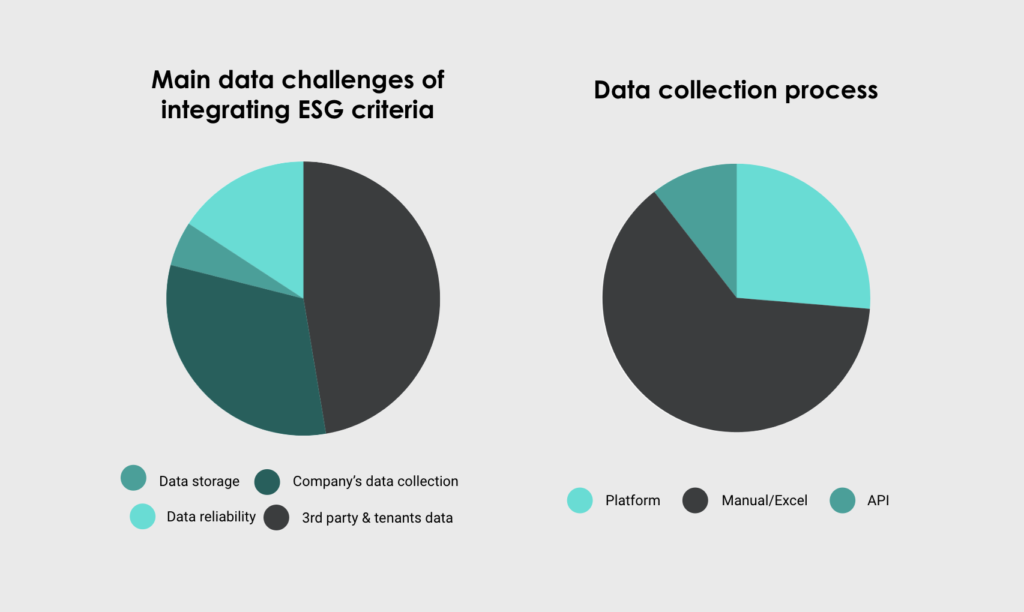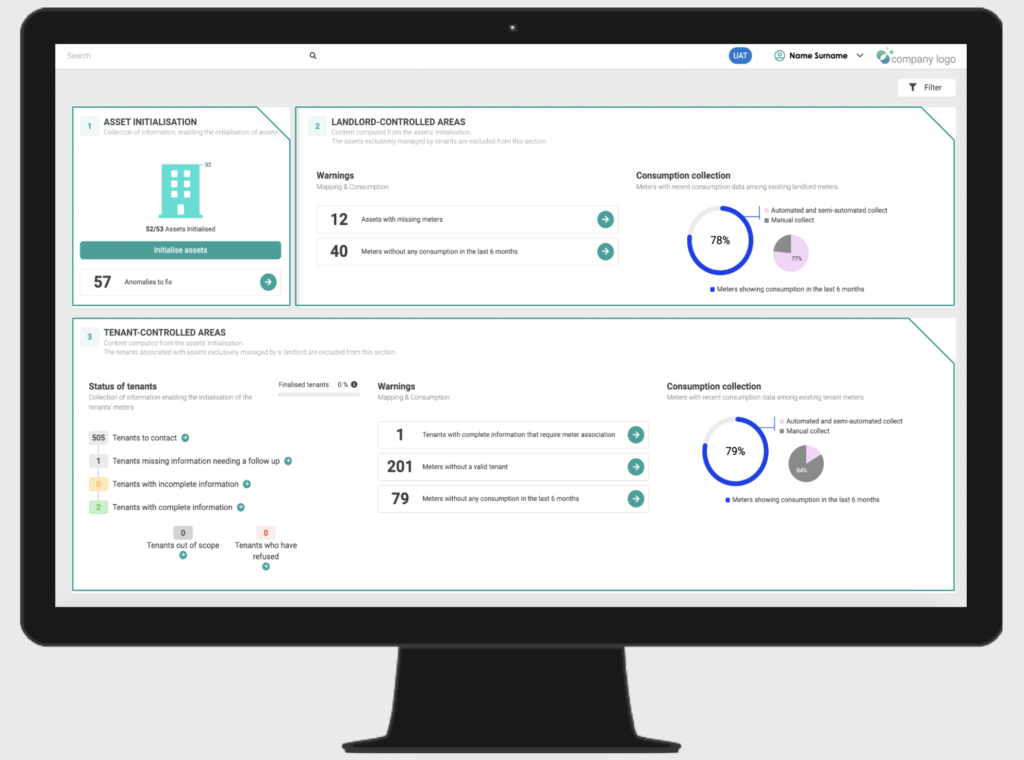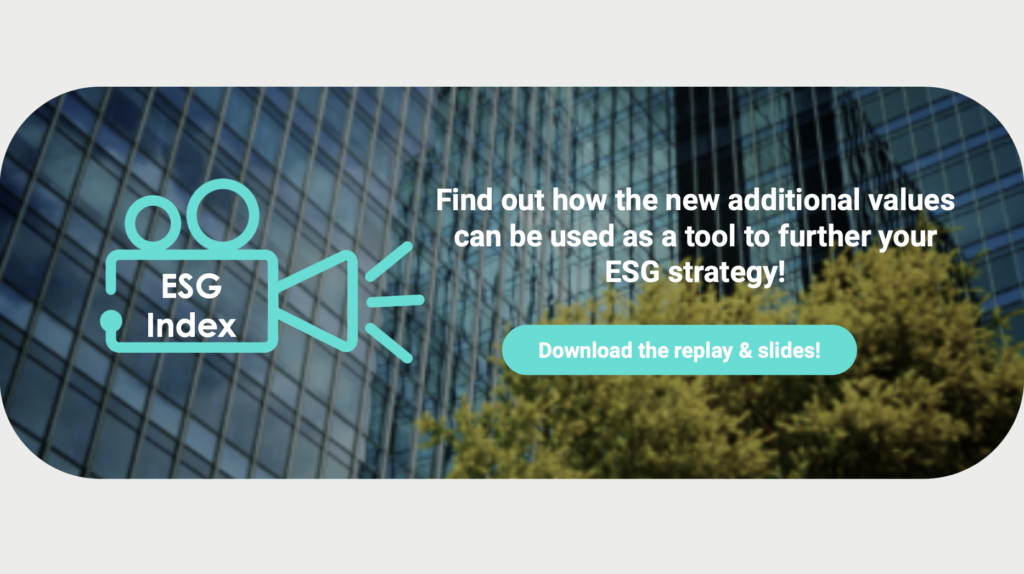With Deepki Collection Progress Board, our users can easily access and analyze the data collected by the platform, all while receiving expert guidance from our advisors to optimize data collection strategies. Whether you’re a new user or a seasoned professional, our platform’s automated data collection and Deepki’s Collection Progress Board are here to support and ensure you make informed decisions and optimize your business processes.
Data quality & management
The collection of data is an essential aspect of Deepki’s service since it is one of the factors that allow the company’s clients to make better decisions regarding ESG strategies. This is, however, a central pain point since it represents a significant amount of work that must be carried out continuously in order to ensure that data has been collected on the latest updates regarding the portfolio, such as data on assets, data of new tenants, as well as the maintenance of the correct information. Thus, Deepki has developed a Collection Progress Board to serve as a tool to facilitate and optimize the collection of data from real estate projects efficiently and reliably so that they can be easily managed on a day-to-day basis.
A recent survey from one of the webinars conducted by Deepki showed that data quality is one of the biggest worries clients express about data. Today a large portion of them still use manual or Excel solutions to track data collection progress (see image 1).
To optimize data quality, the Deepki ReadyTM platform:
- automatically collects data when possible,
- alerts users about missing data, and
- computes estimates based on data provided so as to solve issues related to missing or inaccurate data.
The Collection Progress Board focuses on the second point, alerting users about missing data and highlighting discrepancies.

Image 1: A recent poll created during one of Deepki’s webinars depicts some of the issues clients face in regard to data collection and coverage.
Read more: Real Estate: data prediction, and why your CSR director can no longer do without it
The power of the Collection Progress Board
The Collection Progress Board is a feature in Deepki ReadyTM – primarily for Property Managers – that allows users to keep track of the assets, tenants, meters, and consumption data collected on the owners’ platforms.
The Collection Progress Board is a highly efficient tool that enables users to enhance the rate and quality of their data collection processes. With its comprehensive functionality, users can easily collect data, identify data gaps and discrepancies, and rectify them directly within the platform while working collaboratively.
The Collection Progress Board streamlines data collection steps by providing a guided process that includes initializing assets, collecting landlords’ data, and collecting tenants’ data. Unlike data collection through Excel, this platform empowers users to work collaboratively, view the immediate impact of their inputs, and focus directly on missing data. This collaborative tool enables all parties to collaborate seamlessly, resulting in the most complete and efficient data collection possible.
In the context of corporate operations, Asset Managers (AM) usually rely on Property Managers (PM) to collect data and feed it into Deepki ReadyTM. PMs must identify and correct any missing or erroneous data to ensure accuracy and completeness, enabling them to report back to their AMs confidently. To facilitate this process, the Collection Progress Board offers a user-friendly tool that guides PMs through three distinct data collection steps. By leveraging the power of the Collection Progress Board, PMs can optimize their data collection efforts and provide AMs with reliable data for informed decision-making.

The feature is articulated in 3 sections, each corresponding to a different data collection step in Deepki’s data collection process:
- Asset Initialisation: To provide basic information on the meters and invoicing
- Based on the information provided in the asset initialization stage, the Deepki ReadyTM platform performs automatic reliability checks and raises anomalies if discrepancies are found. Anomalies arise when there are discrepancies between the asset initialization and the meters data provided. This is why asset initialization is the initial step, to begin with, before moving on to the remaining areas.
- Landlord-controlled areas: To provide landlord meters and consumption
- Tenant controlled-areas: To provide tenant mandates, meters, and consumptions
Read more: Data collection: going for a pragmatic approach
The first step towards computing coverage KPIs and estimations
Users can initialize their assets with the Collection Progress Board and then focus directly on missing data. Thanks to the information provided in the assets initialization, Deepki can assess which utilities and meters are expected on each asset and, therefore, compare them with what has been collected.
Knowing the coverage is necessary for identifying areas that require further data collection. Deepki computes coverage KPIs for each asset that give a quick and detailed overview of how much data has been collected and how much is still missing for each asset.
Having coverage indicators is a valuable tool for ensuring the accuracy and completeness of data collected from meters. These coverage KPIs are then the basis of Deepki’s estimation methodology to help ensure the diminishing of missing data.
Read more: Real Estate: the compelling case for automatic data collection
Conclusion
The Collection Progress Board aims to make data collection more efficient and reliable by centralizing actions, automating data, and alerting you with the needed steps. This will help major real estate players keep track of their ESG journey and ensure a simpler reporting season. Deepki’s data collection feature is not only user-friendly, but it also emphasizes the reliability of the data.
Find out about the collection board



